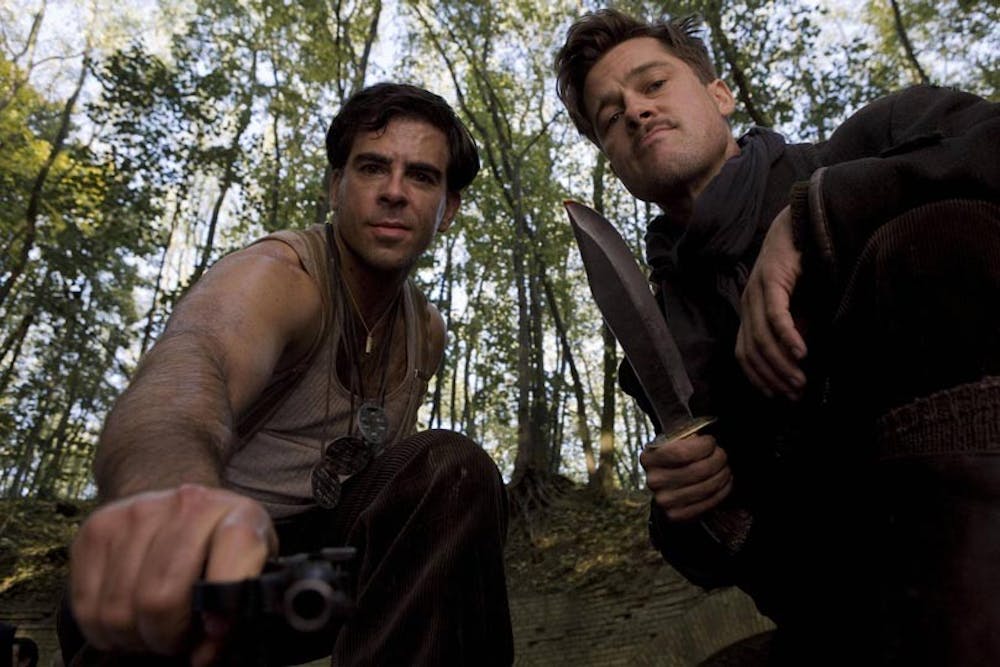My parents are running out of things to do when they come down to D.C. They’ve owned the National Mall and explored neighborhoods like it’s nobody’s business. And monuments? Please. Over their Labor Day visit, they pledged to cross off the last place on their list of obligatory, touristy D.C. destinations: the Holocaust Museum.
This particular visit marked my eighth return to the museum. With class trips and friends and family in town on vacation, I’ve become somewhat of a Holocaust Museum regular. The gift shop cashier and I are rather tight. What made this latest visit particularly interesting was the fact that later that night I caught a showing of genre-fusing auteur Quentin Tarantino’s Nazi-huntin’ adventure “Inglourious Basterds.”
Each time I leave the Holocaust Museum, I wouldn’t say that I yearn for a vengeful, blood rampage of revenge. The museum’s philosophy strives to deter such sentiments. But I won’t lie. There was something incredibly — and fine, sickly — satisfying about seeing the Nazis reap the product of what they’d sewn. At the hands of their sufferers, no less.
The revenge film is nothing new for Tarantino. After “Kill Bill,” “Death Proof” and now “Inglourious Basterds,” I might even say he’s the genre’s poster child these days. The revenge laden in “Basterds,” however, is a universal aberrance. Everyone hates Nazis. Especially Brad Pitt, who stars as Lt. Aldo Raine, a good old southern boy with a fearless troupe of Jewish-American soldiers, the Basterds, who hunt and exterminate Nazis in German-occupied France. The vigilantes are instructed to mercilessly retrieve the scalps of Nazis — an order they take very seriously and with a blatant degree of pleasure.
Tarantino does too. The audience is offered close-up shots of Nazis as the Basterds carve their scalps off like a slice of Thanksgiving turkey with an array of rusted instruments — the kind of weapons Sub Zero or Scorpion would wield in Mortal Kombat. As gratuitous and barbaric as the violence committed by the Basterds may be, I could count the winces coming from the audience on one hand. In fact, I recall cheers when notorious “Bear Jew” Basterd bludgeoned a Nazi officer to death with a baseball bat.
“Inglourious Basterds” has faced ample criticism, but Tarantino and controversy go hand-in-hand like bread and butter. The chief complaints circulating around his latest work lie in its hyper-unrealistic treatment of history and inadequate portrayal of the Holocaust. I’d have to wager that those making said complaints entirely missed the point of the film. Or they just hate Tarantino, and there are plenty of reasons to. The film clocks in at an unapologetically long two-and-a-half hours, most of which is spent on drawn-out, now “Tarantinoian” conversations at tables.
For those expecting gritty battlefield scenes of warfare, go rent “Saving Private Ryan” or something because there is none here, and this is where some critics missed the boat. This isn’t a war film. This isn’t a satire film. This isn’t an action film. This isn’t a fantasy film. It’s all four, plopped into a blender and put on full blast. Of course the film’s historically inaccurate — almost laughably so. This is a tongue-in-cheek odyssey of revenge in a fantasy world where fate is turned on its head and Nazis are the ones shivering in their boots. Some found this vision perverted or in violation of Ghandi’s “eye for an eye” principle, but with “Basterds,” Tarantino did something pretty ballsy: he rewrote history. In the blood of Nazis, nonetheless.
Back in 1991, Oliver Stone faced great scrutiny for his re-interpretation of history in “JFK,” which showcased some of the conspiracy theories surrounding President Kennedy’s assassination. Following outcry from audiences across the nation, Congress established the Assassination Records Review Board to compile evidence surrounding the event for the public to make its own assessment.
Sure, “Basterds” won’t inspire a Nazi Records Review Board, but unlike Stone, Tarantino isn’t striving to unveil some concealed truth. We all know Joseph Goebbels, Adolf Hitler and dozens of Gestapo officers didn’t perish in a movie theater set aflame by a vengeful Jewish French femme fatale. Tarantino isn’t trying to educate viewers, but rather visualize a wretched revenge fantasy — one we might not be too keen to admit we hold. Just remember that this realized fantasy is as historically accurate as “Pocahontas.” Just less racist and more fun.
Is an ultra violent Nazi-huntin’, scalp-skinnin’ bloodbath a healthy means of memorializing the Holocaust? Of course not, but after my eighth trip through the devastating exhibits of the Holocaust Museum, I’ll be the first to admit that “Inglourious Basterds” does fulfill a twisted, primal desire: to see history’s worst villains get theirs.
You can reach this columnist a thescene@theeagleonline.com.





